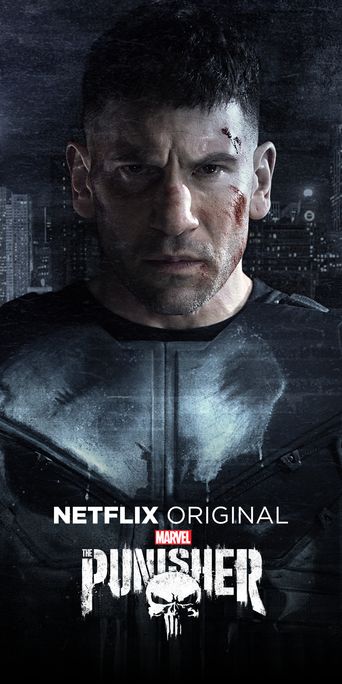 Here’s the good news: The Punisher Netflix series isn’t as bad as the rest of the Netflix-Marvel series have been. Here’s the bad news: that still doesn’t mean it’s very good.
Here’s the good news: The Punisher Netflix series isn’t as bad as the rest of the Netflix-Marvel series have been. Here’s the bad news: that still doesn’t mean it’s very good.
I don’t know if it’s Marvel or Netflix who misread the trend of binge viewing, and decided that what people really wanted from a streaming service was 13-hour-long movies. All I know is that every single Marvel series has had the exact same problems: a throwaway first episode (you can skip all of them, and miss nothing), numerous lengthy conversations that are, ultimately, meaningless (advancing neither characterization nor the plot), and meandering plotlines that always bog down in the middle of the series. Now, The Punisher is better than all the previous series—it doesn’t hit the bog until episode six or seven, and it’s mostly out of the bog by episode ten—but it still falls prey to every single one of those sins.
It’s like nobody was paying attention to the lessons of Breaking Bad and Justified. Those two shows—critical and commercial hits—showed that 13 episodes is the perfect length for television dramas. Any more, and filler or rehashing proliferates as writers run out of ideas; any less, and the audience doesn’t get enough show to feel satisfied.
13 episodes, each with their own beginning, middle, and end, episodes that followed after the last and lead into the next, but episodes that could be viewed all by themselves and still tell a satisfying story. Taut episodes, episodes filled with events and conversations that mattered, episodes that held your attention—BY NECESSITY. This was the formula for great serialized television drama, and it worked.
Breaking Bad did this brilliantly. They had an entire episode devoted to Walter and Jesse chasing a fly around their meth lab, and it was RIVETING. They knew how to make each episode different, so that they stood out, so that each was different from the rest (in big ways or small ways).
The “13-hour-movie” approach ensures that each and every episode is stylistically identical, by deliberate design. 13 stylistically identical episodes is BORING. It’s exactly what you don’t want when you’re binge viewing. Variety is the spice of life, and Marvel’s approach ensures that variety is minimized.
Marvel’s approach does not work. Sure, The Punisher actually had some kind of action at the end of the first episode, defying the previous trend in these shows, and yes, they tried to keep things moving (whereas Luke Cage didn’t even try.) Maybe this means Marvel has started to realize its mistakes, and back off from them. Maybe. This series is an improvement.
Even so, Marvel’s refusal to embrace the hard-won lessons of the last decade of serialized dramas means that, despite moments of brilliance, each series (when taken as a whole) is never more than mediocre.
Jasyn Jones, better known as Daddy Warpig, is a host on the Geek Gab podcast, a regular on the Superversive SF livestreams, and blogs at Daddy Warpig’s House of Geekery. Check him out on Twitter.
They could have simply dropped the whole ptsd/white racist/stolen valor subplot and it would have sped it up immensely.
It was unnecessary. They should have started with a grab you by the throat bang in episode one and two not a retread of Rambo two beginning spread out over an hour.
I suspect that the scriptwriters are deeply bothered by some superversive elements of the Punisher:
Man loses his family in a violent act there by releasing him civilized restraints (hommage to Conan)
2) he becomes the sword of God dispensing justice or vengence? a tension to explore
3) others help punisher for a mix of motives
4) What’s the difference between justice and vengeance?
5) is the state no different than a robbers band?
until the writer embrace these deep questions to explore the show will just be marginally better never memorable
xavier
I’ve been listening to Diversity and Comics’ review of the series, and it seems to be thoroughly infested with SJW tropes, including saintly blacks and Hispanics, evil whites, insanely tough, strong, intelligent, and perfect women contrasted with wimpy, weak, idiot, and disgusting men.
Speaking of The Punisher, I really liked the 1989 film with Dolph Lundgren, despite its poor reputation. Among other qualities, the 6′ 5″, 240+ pound, muscle-bound Lundgren captured the physical aspect of the character. Compare that to the scrawny 5′ 10″, 150 pound actor playing him in the series.
-
You know that thing kids do when they’re playing, to pretend they’re “big and strong”, where they will arch their arms alongside their bodies and puff their chests? … It’s amusing to see this actor doing it constantly, all the way back in Daredevil S2, while he’s got skinny arms poking out of loose shirt sleeves. Also, he looks like a chimp.
-
And Lundgren’s limited range didn’t hurt the movie much–violent and obsessed is well within his reach.
The scene at the end, where he gives the dead ganglord’s kid a gun and offers him a chance to avenge his father, was worth the price of the tape all by itself.
By the way, “The Fly” is the most underrated episode of “Breaking Bad” and one of the funniest television episodes I’ve ever watched.
This was in no way better than the two seasons of Daredevil or the first season of Jessica Jones.